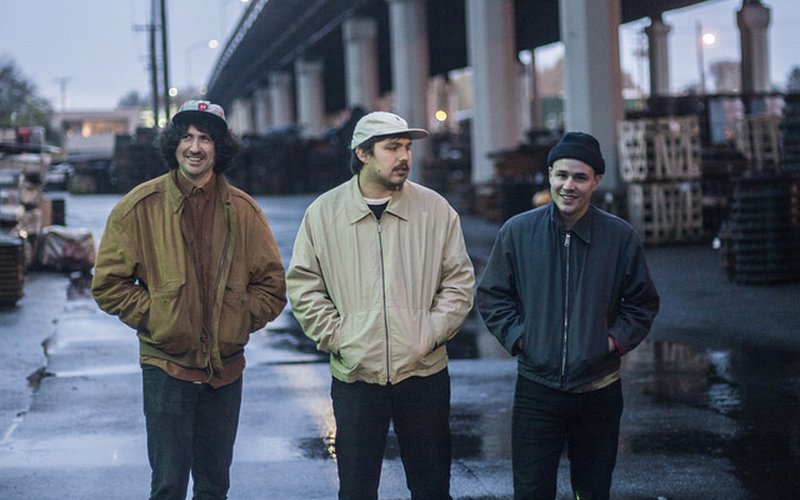
Just off of the 99 overpass, Feed stowed themselves away in their practice space affectionately referred to as the Dank Dungeon. Armed with a Tascam 488 tape recorder, the trio of guitarist Chase Hoyt, bassist Matt Kolhede, and drummer Pat Schowe spent months crafting their self-titled debut album, out now via Kolhede's own Help Yourself Records. It's about as all-star of a team you could hope for in Seattle. Hoyt and Kolhede and previously played together in the heavy and frantic local favorite Ubu Roi and Pat Schowe has hopped between numerous bands, most notably Rose Windows. Putting them into a room, it's no wonder they'd emerge with a record as fine-tuned, weird, brutal and exciting as Feed.
Chatting with the band, it was clear that their debut tape is just the start of something bigger. There's a kinetic energy between the members, all wanting to get back to recording as soon as possible. While the band does play live, it's a project that was conceived with the recording process in mind. While their own hands-on DIY recording experience was limited going into the record, the band forged ahead in creating something that sizzles like a long-lost psych relic from a bygone era. More than just basement experimentations, the band's record is packed with some of the most hook-heavy rock songs you'll hear all year. That's no accident either. On a wet and gloomy November afternoon, the band revealed a bit about the process of building these songs and hinted a little bit about their ambitions for the project going forward.
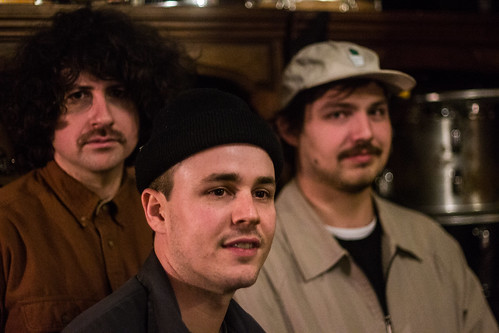
KEXP: Tell me a bit about how Feed came together.
Pat Schowe: I mean they've been playing music for a while in Ubu Roi. But I think [Matt and I] met at Light In The Attic. We were both working in the warehouse at Light In The Attic.
Matt Kolhede: So we were both in the Central District at the time. And so we would drive to and from work, carpool. Rose Windows was still going at that point and Ubu Roi was still going at that point too. That's how I first met Pat.
Chase Hoyt: Matt and I've been playing music since college, in like 2010 or 2011.
Kolhede: Yeah, we went to UW together. Chase was, like, the first person I met, basically.
Hoyt: I think after Ubu Roi ended, Matt and I were like... well, we didn't really want to give up this practice space cause we shared it with the other two dudes in Ubu Roi. Really. We just like having a spot where we can just come play because we all live in apartments and stuff like that. So we were like, 'We want to keep writing music together, we don't want to stop playing music,' so Matt and I kind of started doing a little side project recording thing called Spaced Out. And that was just the two of us like playing with like a drum machine and I think [Pat] heard some of it.
Schowe: I heard it and then I reached out to Matt and was like, 'Dude I fucking love the tunes. If you're ever in need of a drummer I'm totally around.' You know, it was around the time that Rose Windows was on the outs. I kind of wanted more stuff to do. And then Matt hit me up like, 'yeah maybe.' And, you know, a few months had passed and we were just like, 'let's just jam.'
Kolhede: There was a little bit of hesitation just because like Chase and I... the whole idea with Spaced Out was like... We made this Ubu Roi record that took for-fucking-ever to make because we recorded everything ourselves and we really didn't know we were doing. And I think we just spent too much time on it.
We wanted to keep making music together, but we were like, 'We don't necessarily even want to play shows or anything like that.' We just want to write songs and record them then just like put them on Bandcamp and these batches, I guess, and then move on to the next ones and just try and like be as productive on the writing and recording things. So that's why it took so long to get together to actually playing together 'cause Pat hit me up and we were like, 'I don't even know if we like even want to do that right now.'
Hoyt: But it was cool because the first songs that we were a couple of the Spaced Out songs. So it gave us like a really good...
Schowe: ...platform to kind of start writing new stuff with. It was cool. But I also didn't want to intrude on stuff that you guys created, you know.
Hoyt: Whenever you're jamming with new people there's that thing of like, 'What do we play? Where do we start? Do we just play? Do we just literally make up a song right now?' It's kind of cool to just have something at least to work off of.
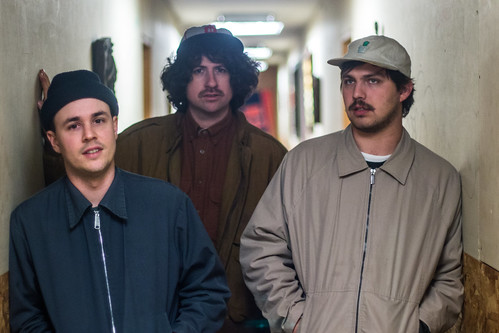
KEXP: So is Spaced Out still a thing or did it just morph into Feed?
Hoyt: It's still a thing. We've been working on these three songs for like a year. We're almost done.
Kolhede: We haven't been actively working on them. We recorded a bunch of stuff and then like didn't work on them for a long time. I think it is because we were doing the Feed stuff. I mean, I think we probably started them before we started recording the Feed tape. So that just kind of like it took precedence and we got into doing that. But they're almost done.
KEXP: You mentioned you had some hesitations about bringing someone else in. What made you finally decide you wanting to bring Pat in as a drummer?
Kolhede: Honestly, after just like playing together once it was just like, 'Fuck, Pat is a great drummer,' and we were like, 'Go check out these [Spaced Out] songs and we can play some of them the first time we played together.' And it was just like, as cliche and corny as it sounds, it just felt so good and like natural. [Chase and I] both played guitar in Ubu Roi but I grew up playing bass in bands and is the first band I've played bass in a while and it all just felt really natural and like there's something about like three people. It was simplified.
Hoyt: Yeah I think that was the main hesitation for me. Being in a band before this that was four people, then Pat was in a band that was like seven people...
Schowe: We were up to nine at one point [laughs].
Hoyt: Just the idea of entering into another sort of band situation where, you know, organizing schedules and you're like coordinating with different people. It was kind of daunting and we definitely liked the convenient aspect of coming down here just the two of us. It was very low pressure. But when the three of us started playing here it was like, 'Oh wow, we can do a lot with just the three of us.' Practically speaking, it's a lot easier than it has been, at least for me, being in other bands, like just playing with three people. Even just organizing practices.
Schowe: And also going off of that, being able to just kind of push or like working within the limits of only having three people and trying to push that as far as we can go is kind of like a cool challenge for us. It is for me.
Kolhede: Yeah I mean we've talked about like, 'Oh it'd be cool to get somebody to play synth or something or do something else and then we always just fall back like, 'We've got a good thing going. Don't fuck with it.'
KEXP: When I listened to the record, I was surprised to go back and look and see that you're just a three piece. There's so much going on here.
Schowe: It's cool to give yourself those limitations. Push it as far as you can go.
Kolhede: And I think our recording technical ability is somewhat limited also.
Schowe: Yeah (Kolhede and Hoyt) are great. I'm like way the fuck behind that whole like you know what I mean... especially with Rose Windows we had a lot more... Randall Dunn was kind of dude that just like did everything for us. So it's cool to be able to work in an environment with these guys because they know what they're doing to an extent so I can make pick up stuff from just watching them and being around a little bit. You know, more hands on.
Kolhede: It's also like awesome having Pat because he has like that like studio experience and he's like you know made bigger budget records that are like pro as fuck. Chase and I don't really have that experience at all.
Schowe: Little bit of knowledge there.
Kolhede: Basically we just know how to use that eight-track really well.
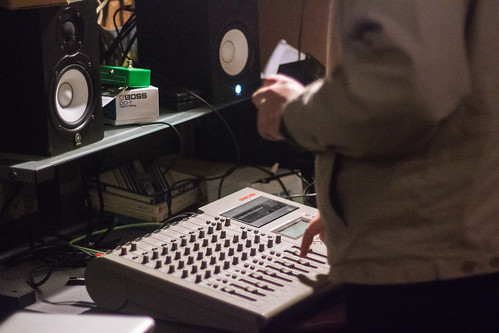
KEXP: When you start digging into bands like Ty Segall and acts on labels like Burger Records, it seems like Tascam tape recorders are becoming a sought-after means of recording.
Kolhede: It's strange like that but it's like any time the record stuff using a computer it's just like turned out really like lame sounding.
Hoyt: I feel like it's a lot more work to get things to sound good on a computer. Something about, like you can just plug stuff into that and it just sounds good. There is a little bit of a learning curve in just terms of like setting up the machine and how to route the signal through and everything but once you passed that the quality of recordings that you're able to make with it versus like the learning curve that you need to master to like work in like Pro Tools or something like that. It's a lot more immediate, you know, which is cool.
Kolhede: Also just like twisting knobs as opposed to like clicking stuff feels good.
Hoyt: Yeah I kind of think it's like a thing of like when you're dealing with music in a computer and like a digital audio thing like you can do anything to anything. So it's like your spectrum of manipulation or whatever you want to call it is so wide. But when you're in like a tape machine, it's like every single thing is treated the same way. It's like you have a volume knob, you have a left/right and you have a bass and a treble and everything is like put through that same process. So it's like you only have so much space to fill up. So it's kind of easier to decide where things go. Yeah and in a computer, because there are so many options, you can just spend your life dialing in a bass tone.
KEXP: There's definitely a lo-fi quality to how you recorded it, but it feels weird to call it lo-fi because it sounds so good, kind of embracing the graininess of the recordings. Was that something you were looking to utilize on the record?
Kolhede: I think that goes back to the three-piece thing. When we play live, Chase plays out of two guitar amps that are on opposite sides of the stage and has a stereo delay pedal so it feels bigger than just like three people playing it. And we kind of wanted to best as we could like mimic our live setup.
Hoyt: That's how we set up the guitars we recorded. The guitars are like a studio deal. So it's like two amps, like left and right type thing. Yeah, it was super fun and cool to be able to record that way. Also kind of excited to do something different next time.
Kolhede: We certainly want to keep fucking around not doing exactly the same thing. We're a rock band, you know, we play rock music but at the same time like recording with tape machines, it's just really fun to just like fuck around and see what kind of noises you can get. And so yeah definitely want to not just mimic the setup last time.
Hoyt: I mean in terms of the recording stuff for me, and I think for Matt too, it's totally just a learning thing. We just want to get better at recording music. I think like experimenting with just different ways to set it up and different ways to route things into the tape machine is like super just fun. It's super rewarding when you're able to just come down here and make something that sounds really cool with just the stuff that we have.
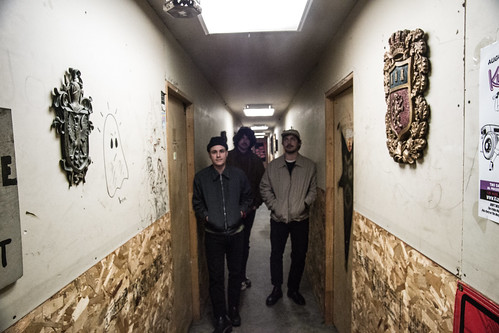
KEXP: A lot of times with this type of music, I feel like there's an inclination for bands to just experiment and gets cool sounds but the songs get lost. But on your record, there are very definitive "songs." I can replay them in my head; there's a structure to it.
Hoyt: I think we all really like hooks. Writing a lot of Spaced Out songs when we first started, a lot of it was like it, at least me, was straight up just trying to write like Tom Petty style songs with a drum machine and it was all very much like, 'Here's the verse, here's the chorus, here's the bridge, here's the guitar solo, bring it back to the chorus.' You know, that type of pop structure.
And I think in terms of trying to learn how to record songs and get better at recording, having that sort of backbone is really helpful because it gives you just a really firm foundation from where you can actually start to do weird shit. I think that jamming and everything and all that stuff is the most enjoyable part of playing for me, but it has to have some sort of structure. Some sort of thing that it comes back to or it's just a little too self-indulgent.
Kolhede: At least for like writing for me, I don't think I'm good enough of a musician to not rely on some kind of song structure. Whenever I start writing something I think about it in a general pop structure.I think like, 'verse, chorus, pre-chorus' kind of thing. And maybe that's just been ingrained in me from just like listening to music or something. But I don't think it's a bad thing. I like songs. That's what I prefer to listen. I like hooks.
Schowe: I also like improv-y stuff, I like really jammy stuff, but, you know, it's just time and place. And I also, like what you were saying, just having a kind of the canvas to work on. Everything else can just be whatever brushstrokes as long as you have that solid thing.
Hoyt: And also just when you're listening to your record it's just easier to just digest a record that's made up of songs.
KEXP: It's cool to hear you talk about hooks, too. Aside from just the traditional sense of like the lead melody, there's a lot of hooks all over this record. The riffs get stuck in your head. And having the drum so forward in the mix adds this poppy but not pop thing to it.
Hoyt: I think one cool thing that we do, if we can just toot our own horn a second, a couple of the songs — And it was like an accident — the hook or the chorus or the main thing of the song is just like a big fat guitar riff rather than like a traditional chord, vocal melody type thing. To me, that's, like, a really cool way to stay within that structure but still be a very heavy rock band.
Kolhede: And I don't think it's intentional necessarily. Like, 'Oh this is the part that should get stuck in somebody's head.' It's just that this is the part that jumps out as something to build off of and build around because it's ear-wormy.
Schowe: I'm also a big fan of bass and drums just really like locking in on something that is almost like beat-in-your-head repetitive and then kind of have guitar just sort of lay over it like a... blanket, maybe? [laughs]
KEXP: A lot of the songs like “Druggie”, “Different Life”, and “People Are Sick” all have these themes of feeling apart from the world around you or distaste for the way things are. What draws you to explore these themes?
Hoyt: We like never talk about lyrics together. I mean, if the dudes ask I'll tell them what I was thinking about or vaguely what it's about. That's not really how I personally write lyrics. I don't really sit down to be like, 'I have this message that I'm gonna get out.' It's a lot of just like [hummming sound]. You know just, the words that sort of come out of that. Just kind of humming along. Yeah I mean I think like thematically, I guess there's definitely a lot of sort of stuff about alienation, that sort of feeling...
Kolhede: ...Just like out of step. Which, I mean, I don't think it's like a very unique position necessarily, but I think there's definitely something true to that where it's just like, 'What is going on with everybody?' [laughs] Like people in our age range, feeling out of step with that or feeling out of step with like, you know, trying to make do in this city right now while it's getting really expensive and your friends are moving away and people are leaving and stuff. I think we have, generally, all three of us, have similar opinions on things and that's probably the cohesiveness thematically.
Schowe: Plus you know there's so many different ways you can take certain lyrics and stuff like that. I feel like whatever you want to get out of the lyrics or whatever you take away from it, that's awesome. I think that's great.
Hoyt: Yeah, it kind of almost seems pointless to spend time laboring over something that is kind of, in a lot of ways, up for grabs in terms of listener interpretation.
Kolhede: I just think that Tom Petty, honestly. His lyrics are so fucking vague.
Hoyt: They're so vague but every time you listen to a Tom Petty song you're like, 'That's me!'
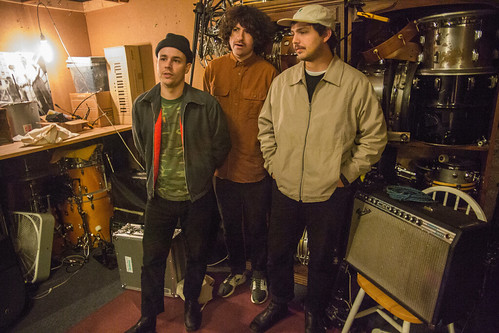
KEXP: Do you guys imagine life becoming kind of like a prolific project where it is kind of constantly releasing stuff?
Kolhede: I fucking hope so. I don't know what it is, but I've always just been like totally drawn to bands and people that just like are constantly churning shit out.
Schowe: There's a certain kind of work ethic that comes behind it.
Kolhede: Yeah totally, it's really admirable.
Hoyt: And it's just a great way spend time, honestly. With all the things you can do on a day, just like coming down and having three or four hours just kind of melt away because you're focused on something... it's just super fun.
Kolhede: Just from personally enjoying the writing and recording side of it so much, whenever I see bands that are super prolific it's like, 'Oh I know that feeling. I understand why they do this.' It comes from a place of joy.
Feed's self-titled debut is available now via Help Yourself Records.
Every Shabazz Palaces record feels like a transmission from a far-off planet. In 2017, the Seattle hip-hop duo took this aesthetic a step further with two records -- Quazarz: Born on a Gangster Star and Quazarz vs. The Jealous Machines. The albums collectively chronicle the story of an alien sent t…
David Bazan's Pedro the Lion project returns after an eleven year absence. Playing three shows at the Tractor Tavern in December.
Every week, KEXP features a new local artist with an interview and suggested tracks for where to start. This week we're highlighting Seattle children's band Recess Monkey, who play KEXP's Deck The Dock this Sunday from 2 to 4 PM.
Legendary Television guitarist Richard Lloyd discusses unorthodox way he wrote the book, how his memories surfaced for the memoir, and how he feels now that it's completed.